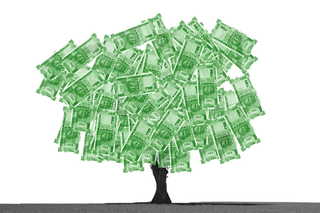
How Government Reliance on Capitalism to Address Climate Anxiety Only Makes It Worse
‘Green capitalism’ puts climate action in the hands of corporations, who are unwilling to undo profitable systems that lead to ecological damage.

The kids are not alright. A global Lancet study showed that today’s youth are worried about the future. Of the 10,000 participants between the ages of 16 and 25, 45% said their anxieties about climate change affect their daily lives. Over half feel that humanity is doomed, three-fourths are frightened of the future, and two-thirds feel grief and hope simultaneously.
According to the report, young people are particularly affected by climate change fears as they are still developing. As a result, mental and physical health issues are more common. Notably, the grief and anxiety are not coming out of nowhere: young people know what and whom to blame, and it is squarely on the shoulders of governments failing to act.
“This shows eco-anxiety is not just for environmental destruction alone, but inextricably linked to government inaction on climate change. The young feel abandoned and betrayed by governments,” Caroline Hickman from Bath University, lead author of the study, told BBC News.
On its face, governments seem to be turning their attention towards solutions, albeit while dragging their feet. Earlier this year, the European Union released a ‘green’ legislation package to impose corporate environmental standards. These include, among others, a ‘Taxonomy Regulation’ and a ‘Corporate Sustainability Reporting Drive.’ Measures like these are becoming increasingly common across the world. They have in common that they entail an effort to imbue climate consciousness into polluting corporations to decarbonize and transition out of a fossil fuel economy.
Some call this ‘green capitalism’: it is the effort to achieve sustainable climate change alleviation through market solutions, with businesses and profit playing an important role. Indeed, green capitalism, or eco-capitalism, is now an established school of thought that proposes various strategies, including but not limited to: green consumption, carbon trading (a system of ‘pollution credits’ in which governments incentivize businesses to produce fewer greenhouse emissions and trade in their credits), and total cost accounting (a method for corporations to account for “people, planet, and profit”).
With this ideology gaining more credence, why is it that the youngest generations are still so disillusioned?
Many eco-capitalist strategies are still too controversial in most parts of the world to become a reality. For many, they represent government interference in the free market, which would spell disaster. Instead, they propose that the onus of environmental protections should be on individuals based on their wealth and profits. Consuming green will automatically shift businesses towards a greener model, which is considered to be common wisdom. Many studies also validate that consumers now show a greater willingness to spend more on greener products. But this does not account for income inequality, wherein only a few can spend more in service of a long-term benefit, rather than looking after more immediate livelihood needs.
Related on The Swaddle:
Eco‑Anxiety Is Fuelled by Helplessness, Anger. Can We Turn Our Grief Into Climate Action?
But even the other strategies come with their share of problems. Carbon trading is a system that incentivizes large corporations to produce lesser emissions by assigning value to pollution and creating a credit system based on this. The underlying problem, however, is that the emphasis is still around profit rather than people. At what cost will industries reduce their greenhouse emissions, and how much labor would that entail? Further, would a transition to a less profitable, greener model mean that corporations extract the profit from elsewhere — i.e., workers — to compensate?
Then there is full cost accounting, which is feebly in force in the form of environmental regulation in some parts of the world. But the problem here, again, is that environmental considerations are perceived to be a hindrance; less essential and infinitely more dispensable than complex profit calculations.
There have been criticisms and alternative solutions proposed by green capitalist proponents themselves. “Green distribution” is one such alternative that “aims to build consent for green capitalism in marginalized communities.”
However, what is standard across the board in green capitalism approaches is that the profits of big businesses are sacred. Achieving environmental sustainability has to happen through profits or not at all. And therein lies the problem: with the profit motive having led the world into a climate disaster in the first place, finding a profit-based sustainability solution seems to be like the holy grail. The crux of the issue is that over 70% of the world’s carbon issues come from 100 companies alone. In most cases, however, governments defer to corporations when it comes to policy on tackling climate change and profit rules over people’s futures as a result.
Take India, one of 10 countries surveyed in the Lancet study on climate anxiety among young people. The recent point of contention in the climate discourse is ‘net zero emissions’ — a model that aims to offset carbon emissions with carbon absorption. Afforestation, the creation of carbon sinks, and other strategies are some of the proposed measures. India’s opposition to the global pivot to net-zero emissions is that it takes away the onus from developed countries to make more effort to undo the disproportionate damage they have done to the environment.
There is some merit to this: while the earlier conversation focused on reducing emissions worldwide, the new predominant strategy involves balancing current emissions. Once again, corporations are asked to do too little about a problem they exacerbated — yet, they are pitched as the solution to climate change.
“The global economic system of corporate capitalism appears incapable of achieving the levels of decarbonization necessary to avoid dangerous climate change. Humanity is locked into a process of ‘creative self-destruction,” wrote Christopher Wright and Daniel Nyberg for The Conversation.
Under green capitalism, therefore, it appears that the only solution towards alleviating climate change is in corporations’ hands. The emphasis on newer forms of “innovation” to “solve” climate change means more remarkable unwillingness to undo some present systems that threaten the planet. Governments frame alternatives to green capitalism as the antithesis of “development” because development is predominantly viewed in terms of more innovation, more technology, and a drive to improve the quality of life for a few rather than ensuring well-being for all. Therefore, the short answer is this: green capitalism, far from alleviating climate anxiety, only exacerbates it. It keeps us waiting for a Deux ex Machina that will swoop in and save the day — until that day, which is elusive at best, we must look to the future with increasing anxiety.
Rohitha Naraharisetty is a Senior Associate Editor at The Swaddle. She writes about the intersection of gender, caste, social movements, and pop culture. She can be found on Instagram at @rohitha_97 or on Twitter at @romimacaronii.
Related


Scientists Plan to Revive Woolly Mammoths, Raising Bioethical Concerns
